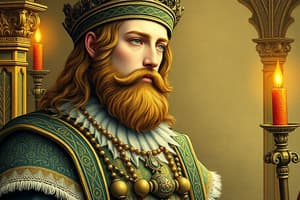Podcast
Questions and Answers
What led to his promotion from being a janitor to a scientist?
What led to his promotion from being a janitor to a scientist?
Exposure to museum's data and writing about Philippine legends
Where did he earn his masters and doctorate in anthropology?
Where did he earn his masters and doctorate in anthropology?
University of Chicago
What breakthrough in Philippine anthropology had already occurred when he returned to the Philippines to teach at the University of the Philippines?
What breakthrough in Philippine anthropology had already occurred when he returned to the Philippines to teach at the University of the Philippines?
Tabon Cave finds
What theory did Jocano propose based on the findings in Tabon Cave, Java, and Peking?
What theory did Jocano propose based on the findings in Tabon Cave, Java, and Peking?
What evidence did Jocano use to support his core population theory?
What evidence did Jocano use to support his core population theory?
What was the main argument of Jocano's core population theory?
What was the main argument of Jocano's core population theory?
In which countries were bone fragments found with the same age and features as those in Tabon Cave?
In which countries were bone fragments found with the same age and features as those in Tabon Cave?
What did Jocano teach while working on his Ph.D. at the University of Chicago?
What did Jocano teach while working on his Ph.D. at the University of Chicago?
Which newspaper serialized his writings about Philippine legends?
Which newspaper serialized his writings about Philippine legends?
Which high school teaching supplement was interested in including his serialized writings?
Which high school teaching supplement was interested in including his serialized writings?
Flashcards are hidden until you start studying
Study Notes
Robert B. Fox
- Graduated in Chemistry from Iowa State University
- Master's degree in Chemistry from the University of Denver
- Volunteered to teach in the Philippines during the American colonization
- Lived among the Ifugaos in the Cordilleras, married Lingaya Gambuk, daughter of an ugao chief
- Pursued doctoral studies in anthropology at Harvard University
- Lectured at the University of the Philippines
Early Life of William Henry Scott
- Born on July 10, 1921, in Detroit, Michigan to a Protestant family
- Interest in archeology sparked by a scholarship at Cranbrook School in Michigan
- Joined the U.S. Navy in 1942 and fought during World War II until 1946
- Taught and studied in China with the Episcopalian mission from 1946 to 1949
- Deported from China after the communist takeover in 1949
Academic Pursuits of William Henry Scott
- Enrolled in Chinese language and literature at Yale University in 1951
- Earned a master's degree at Columbia University
- Served in the Korean War from 1950 to 1953
- Taught English and history at St. Mary's School in Sagada, Mt. Province
- Earned a Ph.D. in the Philippines, exposing him to museum data
- Wrote about Philippine legends surrounding plant and animal life, serialized in Manila Times
- Promoted from janitor to research aid to scientist
- Earned a master's and doctorate in anthropology at the University of Chicago
Tabon Cave Finds and Core Population Theory
- Tabon Cave skull cap discovery by local birds nest hunters
- Dr. Robert B. Fox, chief anthropologist, received the skull cap at the National Museum
- The discovery challenged the migration theory of different ethnic groups in the Cordilleras
- William Henry Scott's core population theory suggests that early human fossils in Java, Peking, and Tabon Cave belong to one population
- Premodern humans in the region gave rise to contemporary Southeast Asians through genetic accretions
Studying That Suits You
Use AI to generate personalized quizzes and flashcards to suit your learning preferences.




